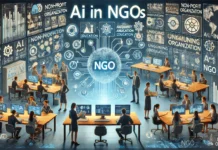Table of Contents
Artificial Intelligence (AI) is increasingly becoming a transformative force in the NGO sector, offering new avenues for enhancing efficiency, improving decision-making, and amplifying impact. In an environment often characterized by limited resources and complex challenges, AI in the NGO sector provides innovative solutions that streamline operations and drive significant positive change. This article delves into the various ways AI is revolutionizing NGOs, from data management and fundraising to volunteer coordination and disaster response, highlighting the benefits and addressing the challenges and ethical considerations involved.
1. Data Management and Analysis
Data is crucial for NGOs to measure impact, report to donors, and plan future activities. AI-powered tools can quickly and accurately collect, process, and analyze large volumes of data. These tools help NGOs identify patterns, trends, and insights that might be missed by human analysts.
For example, AI can analyze data from surveys, social media, and field reports to understand a community’s needs comprehensively. This enables NGOs to allocate resources effectively and design programs that address the most pressing issues. AI in the NGO sector enhances data management by offering real-time insights and predictive analytics, allowing for proactive rather than reactive strategies.
2. Fundraising and Donor Engagement
Fundraising is critical for NGOs but can be time-consuming and challenging. AI enhances fundraising efforts by identifying potential donors, predicting donation patterns, and personalizing communication.
AI algorithms analyze donor data to identify individuals likely to donate and determine the best times to approach them. Additionally, AI-powered chatbots engage with donors in real time, answering questions and providing information about the NGO’s activities. This personalized approach increases donor satisfaction and encourages repeat donations. AI in the NGO sector revolutionizes fundraising by creating more targeted and efficient donor engagement strategies.
3. Volunteer Management
Volunteers are essential for many NGOs, but managing them effectively can be difficult. AI streamlines volunteer management by matching volunteers with tasks that suit their skills and availability.
AI-powered platforms analyze volunteers’ profiles and preferences to assign them appropriate roles. This ensures volunteers are engaged and motivated, leading to higher retention rates and more effective project implementation. AI in the NGO sector enhances volunteer management by ensuring optimal utilization of volunteer resources and improving overall project outcomes.
4. Program Monitoring and Evaluation
Monitoring and evaluating programs is essential for NGOs to understand their impact and improve strategies. AI automates data collection and analysis related to program outcomes, saving time and resources.

For instance, AI can analyze satellite imagery to monitor environmental changes in real time or use natural language processing to evaluate feedback from program beneficiaries. These insights help NGOs make data-driven decisions and demonstrate their impact to donors and stakeholders. AI in the NGO sector significantly improves the accuracy and efficiency of program monitoring and evaluation.
5. Disaster Response and Management
In times of crisis, NGOs play a vital role in providing relief and support. AI enhances disaster response efforts by predicting disasters, optimizing resource allocation, and improving communication.
AI algorithms analyze weather patterns, seismic data, and other indicators to predict natural disasters like hurricanes, earthquakes, and floods. This allows NGOs to prepare in advance and respond more effectively when disasters strike. Additionally, AI-powered tools optimize resource distribution, ensuring aid reaches those who need it most. AI in the NGO sector transforms disaster response by enabling faster, more accurate, and more efficient crisis management.
6. AI in NGO and its benefits
Integrating AI into NGO operations offers numerous benefits:
- Increased Efficiency: AI automates repetitive tasks, freeing staff to focus on more strategic activities.
- Improved Decision-Making: Data-driven insights enable NGOs to make informed decisions and allocate resources effectively.
- Enhanced Donor Engagement: Personalized communication and targeted fundraising strategies increase donor satisfaction and donations.
- Better Volunteer Management: AI matches volunteers with suitable tasks, leading to higher engagement and retention rates.
- Real-Time Monitoring: AI provides real-time data analysis, allowing NGOs to monitor program outcomes and adjust as needed.
7. Challenges and Ethical Considerations
While AI offers significant benefits, it also presents challenges and ethical considerations:
- Data Privacy: NGOs must ensure that the data they collect and analyze is handled securely and ethically. This includes obtaining consent and protecting privacy.
- Bias in AI Algorithms: AI algorithms can perpetuate existing biases if trained on biased data. NGOs must ensure their AI systems are fair and unbiased.
- Cost of Implementation: Integrating AI into NGO operations can be expensive. NGOs need to assess the cost-benefit ratio and seek funding for AI initiatives.
- Skills Gap: NGOs may lack the technical expertise to implement and manage AI systems. Investing in training and partnerships with AI experts can help bridge this gap.
Conclusion
AI is transforming the NGO sector by enhancing efficiency and increasing impact. From data management and fundraising to volunteer management and disaster response, AI offers innovative solutions to the challenges faced by NGOs. However, it is essential to address the ethical considerations and challenges associated with AI to ensure its responsible and effective use. By embracing AI, NGOs can better fulfill their missions and create a more significant positive impact on the communities they serve.
For further reading on how AI is revolutionizing various sectors, stay tuned to our series on AI in the NGO sector.
FAQ
1. How does AI improve data management for NGOs?
AI improves data management by automating the collection, processing, and analysis of large data sets. This allows NGOs to gain insights from data more efficiently and make informed decisions.
2. What are the benefits of AI in fundraising for NGOs?
AI enhances fundraising by identifying potential donors, predicting donation patterns, and personalizing communication, leading to increased donor engagement and higher donations.
3. How does AI help in volunteer management?
AI matches volunteers with tasks that suit their skills and availability, ensuring higher engagement and retention rates.
4. What are the ethical considerations of using AI in NGOs?
Ethical considerations include data privacy, bias in AI algorithms, cost of implementation, and the skills gap. Ensuring fairness, security, and proper training is essential.
5. How does AI assist in disaster response for NGOs?
AI predicts disasters by analyzing weather patterns and other indicators, allowing NGOs to prepare and respond effectively. It also optimizes resource distribution during crises.



